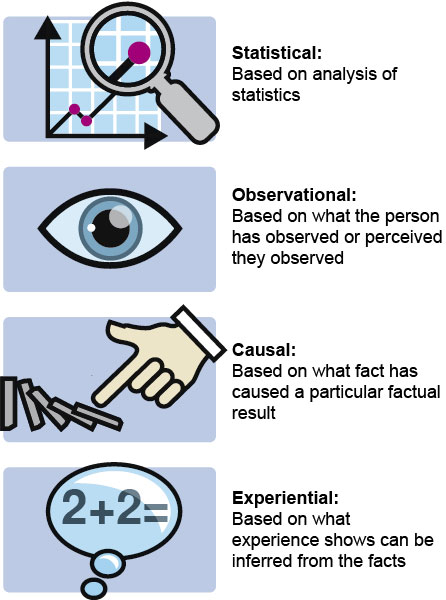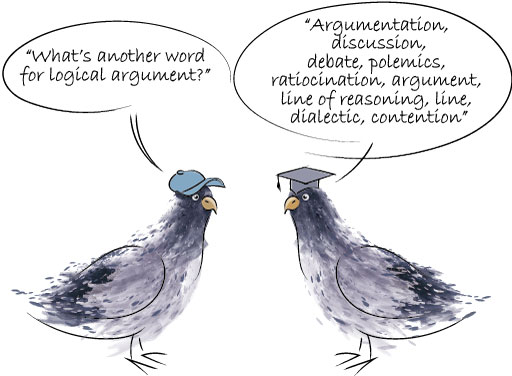1.6 The importance of evidence in the argument
The examples in Activity 2 demonstrate that the provision of evidence to support a particular point of view is crucial to the strength of an argument. Without evidence there is only a personal opinion. So, when analysing the argument of others or developing your own arguments it is important to consider whether the premise and conclusion have been supported with acceptable sources of evidence.
There are many different types of evidence, as shown in Figure 4 below.
Legal study has its own particular requirements for evidence. In many cases it requires legal authority in the form of legislation or case law. The wording of legislation and of judgments provide strong evidence in support of a legal argument.
Journal articles contain the arguments of academic writers, speeches or opinion pieces in the media and it is important to read these articles critically. The authors of these articles invariably have an agenda, something that they want the reader to agree with. So, when reading these articles or opinion pieces, or when listening to speeches, consider the evidence that the author provides for their argument very carefully and think about how they construct their argument. How do they ‘persuade’ you to their viewpoint?
The way that evidence is organised determines the type of argument and you will explore the different types of argument in later weeks.
| Form | Example | Explanation |
|---|---|---|
| Deduction | If you smoke you may get lung cancer. A smokes, therefore A may get lung cancer. | Deductive argument is based on a logical connection between the premise and the conclusion. If the premise is true, then the conclusion is also true. So, it is important to establish the truth of the premise; an untrue premise inevitably results in a false conclusion. In this case the premise is true and so is the conclusion, which is that if you smoke you may get lung cancer. |
| Induction | Of the people I know who smoke many of them have lung cancer and therefore, if you smoke, you stand a good chance of getting lung cancer. | Inductive arguments depend on the number of observations that support the conclusion. So, it is important to examine the strength of the observations. |
| Abduction | Scientific studies have established a high correlation between smoking and lung cancer. Therefore, it is likely that smoking causes lung cancer. | Abductive arguments depend on the degree to which the conclusion is supported by the evidence and data. The more evidence there is, the stronger the argument. |
| Analogy | Breathing toxic substances such as asbestos is known to cause lung cancer. Smoke from cigarettes is toxic and so is likely to cause lung cancer. | The validity of this type of argument requires the key issues of what is being compared to be similar, and to be relevant and significant to the conclusion. You need to show that what is known to be true about one issue is likely to be true for the other issue. |
When constructing your own argument, consider:
- What evidence is available?
- What type of evidence is the most appropriate to support your argument?
- Which evidence best supports the conclusion?
- Which evidence is the strongest, and which is the weakest?


